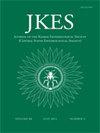土耳其安纳托利亚东南部地区麦田甜菜的生物学特性
IF 0.3
4区 农林科学
Q4 ENTOMOLOGY
引用次数: 0
摘要
摘要:玉米地甲虫是土耳其东南部地区小麦最重要的害虫之一。幼虫期生活在土壤中,可能对小麦作物造成严重损害。小麦单作或使用未经处理的种子有利于这种害虫的危害。土壤湿度高,温度适中,是黄粉虫幼虫发育和攻击的有利条件。土耳其东南部的安纳托利亚地区是谷物生产中心,柔嫩艾美耳球虫会侵袭该地区的谷物幼苗期,造成严重的经济损失。这项研究是在2015年和2017年进行的,目的是确定安纳托利亚东南部地区的宽脊灰蝶的生物学特性。由于气候条件不合适,2016年无法进行调查。对该害虫的成虫进行了监测,并记录了tenebrioides的生物学、夏眠期和冬眠期的数据。结果表明,夏眠期(10月最后一周)和冬眠期(11月底和12月大部分时间)以及卵、幼虫、蛹和成虫期的持续时间与土壤温度和湿度密切相关,其次是食物和空气的温度和湿度。进一步观察到,当温度低、湿度高时,害虫种群会增加,尤其是在早春和晚秋降水量大的年份。本文章由计算机程序翻译,如有差异,请以英文原文为准。
Biology of the Cereal Ground Beetle Zabrus tenebrioides Goeze (Coleoptera: Carabidae) in Cereal Fields of Southeastern Anatolia Region, Turkey
ABSTRACT: The cereal ground beetle,Zabrus tenebrioides Goeze (Coleoptera: Carabidae) is one of the most important pests of wheat in the southeastern region of Turkey. The larval stage lives in the soil and may cause severe damage to wheat crops. Damage by this pest is favored by a wheat monoculture or the use of untreated seeds. High soil moisture and moderate temperatures are favorable conditions for the development and attack of Z. tenebrioides larvae. The southeastern Anatolia region of Turkey is a hub of cereal production and Z. tenebrioides can attack the seedling stage of cereals in this region, resulting in heavy economic losses. This study was carried out during the years 2015 and 2017 to determine the biology of Z. tenebrioides in the southeastern Anatolia region. Surveys could not be carried out in 2016 as the climatic conditions were not suitable. Adults of this pest were monitored and data on the biology, aestivation and hibernation periods of Z. tenebrioides were recorded. Results indicated that aestivation (the last week of October) and hibernation (at the end of November and most of December) times, and the duration of egg, larval, pupal and adult stages are closely associated with soil temperature and moisture, followed by temperature and humidity of food and air. It was further observed that pest populations increased when the temperature was low and humidity was high, especially in the years receiving high precipitation during early spring and late autumn.
求助全文
通过发布文献求助,成功后即可免费获取论文全文。
去求助
来源期刊
CiteScore
1.60
自引率
0.00%
发文量
12
审稿时长
>12 weeks
期刊介绍:
The Journal of the Kansas Entomological Society is a publication of the Kansas (Central States) Entomological Society, publishes research on all aspects of the sciences of entomology, and has world-wide authorship and readership.

 求助内容:
求助内容: 应助结果提醒方式:
应助结果提醒方式:


